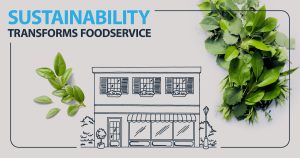How Sustainable Practices Can Help Save Money for Your Foodservice Operation

Sustainability has emerged as a noticeable factor in the success of foodservice operations, offering benefits that extend beyond helping the planet. Adopting eco-friendly tactics is not just an ethical choice but a strategic one. Let’s explore the relevance of sustainability in foodservice operations, focusing on how energy-saving initiatives contribute to financial success.
Benefits of sustainability in the foodservice industry
Implementing sustainable practices in foodservice operations directly translates to cost savings. The math is simple – energy-efficient technologies reduce operational costs by minimizing energy consumption while water-saving equipment reduces water usage expenses.
Energy efficiency
One of the primary pillars of a sustainable foodservice operation is energy efficiency. From foodservice equipment to lighting systems, energy optimization is key in reducing operational costs and environmental impact.
Water-savings
Cooking and cleaning, two primary tasks in a foodservice operation, rely heavily on water. Implementing water-saving equipment, such as low-flow faucets, helps preserve this resource and reduces water-related costs. Foodservice operators can enjoy lower water bills while contributing to responsible water management practices, reinforcing their commitment to sustainability.
Cost savings through energy conservation
Foodservice operators can achieve substantial cost savings by prioritizing energy conservation. While opting for energy-efficient equipment may entail a higher initial investment, the long-term financial benefits outweigh the upfront costs.
Upgrading energy-efficient lighting, HVAC systems, and kitchen appliances lowers utility bills, enhancing the bottom line. As energy prices continue to rise, the financial benefits of sustainable energy practices become even more pronounced, providing foodservice operations with a competitive edge.
Eco-friendly equipment
Here’s a closer look at how foodservice equipment can enhance sustainability:
Refrigeration
- Energy Star certification: Look for refrigerators with the Energy Star label. These units adhere to stringent energy efficiency guidelines, ensuring reduced electricity consumption.
- Variable speed compressors: Refrigeration systems with variable speed compressors adjust cooling capacity based on demand, optimizing energy use, and minimizing waste.
Tips
- Regular maintenance: Keep condenser coils clean and ensure proper door seals to maintain optimal efficiency.
- Temperature monitoring: Set refrigerators to the recommended temperature levels to avoid unnecessary energy usage.
Ovens
- Convection technology: Ovens equipped with convection technology use fans for even heat distribution, reducing cooking times and energy consumption.
- Energy-saving features: Choose ovens with energy-saving features such as programmable timers, precise temperature control, and quick preheat functions.
Tips
- Regular calibration: Calibrate ovens regularly to ensure accurate temperature settings and efficient performance.
Fryers
- Advanced heating elements: Look for fryers with advanced heating elements and controls for efficient cooking with reduced energy consumption.
- Thermal recovery systems: Fryers with thermal recovery systems capture and reuse heat, enhancing overall energy efficiency.
Tips
- Oil management: Regularly filter and maintain frying oil to ensure optimal performance and reduce energy usage.
- Hybrid models: Hybrid fryers that combine traditional frying methods with energy-efficient technologies can offer the best of both worlds.
Tech24’s commitment to sustainability
Tech24’s installation services include a wide range of foodservice equipment, such as refrigeration systems, ovens, and fryers, ensuring businesses have the expertise needed for an efficient and sustainable kitchen setup.
By choosing Tech24, foodservice operators gain access to skilled professionals while benefiting from a commitment to sustainability, making the installation process a strategic move toward operational excellence and environmental responsibility.
Adopting eco-friendly practices in the kitchen contributes to a healthier planet and brings tangible benefits to businesses. Foodservice operators can experience reduced utility bills, increased operational efficiency, and a positive brand image that resonates with environmentally conscious consumers.


























